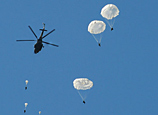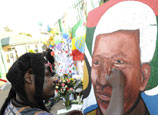
The Philippines is considering giving the United States and Japan greater access to Manila's military bases, the country's defense secretary said on Thursday.
Observers said the latest initiative is a new development in a series of measures the Philippines has taken to ramp up the South China Sea issue ahead of regional meetings of Southeast Asian countries in July.
With help from the US, Manila hopes its military can looks stronger in bargaining with China over the South China Sea issue, they added.
The Philippine government is initially drafting a plan that would allow US forces to spend more time on its military bases - something that could also be offered to Japan's military, Philippine Defense Secretary Voltaire Gazmin said.
"If and when there is agreement on the access, then there will be equipment coming in from the US," Gazmin said at a joint news conference in Manila after meeting visiting Japanese Defense Minister Itsunori Onodera.
"Now as far as Japan is concerned, we do welcome other countries - particularly Japan since it is a strategic partner - in accordance with our existing protocols."
Philippine President Benigno Aquino has already stated that Manila would welcome an increased US military presence, amid contending claims with China over parts of the South China Sea.
But Gazmin made it clear that the US will not be setting up new military bases in the country.
Manila has always tried to create tension on the South China Sea issue during routine regional meetings among Southeast Asian countries to internationalize the issue, said Xu Liping, a researcher on Asia-Pacific studies at the Chinese Academy of Social Science.
US military presence
"It is a trend recently that Manila, Tokyo and Washington have united on the South China Sea issue," Xu said.
"The US is eager to take advantage of the issue to increase its military presence in the region, while Japan hopes the issue can draw more attention from China, so that Beijing has less energy to deal with the Diaoyu Islands issue."
The initiative shows Manila's aim to strengthen its military alliance with the US, said Chen Qinghong, a researcher on Philippine studies at the China Institutes of Contemporary International Relations.
"The Philippines hopes to seek more support from the US to balance China's increasing power in the region, so that it is sufficiently emboldened to bargain with China on the South China Sea issue," Chen said.
He added that Manila hopes the US can help train its troops and modernize the military with advanced equipment.
But the US may not be as generous as Manila expects, because it would not like to be "kidnapped" by the Philippines and harm ties with China because of the South China Sea issue, he said.
The US had tens of thousands of troops stationed in the Philippines, at Clark Air Base and Subic Naval Base north of Manila, until the early 1990s, when it was forced to abandon the bases amid anti-US sentiment and a row over rent.
The Philippine constitution now bans any permanent foreign bases in the country.
Yang Yujun, a spokesman for China's Ministry of National Defense, said on Thursday that the military presence of relevant countries in the region should not harm regional peace and stability.
The Clark and Subic facilities, now partly converted to business and tourism use, still host and service US military aircraft and warships on exercises.
One of those began on Thursday in waters between the Philippines' main island of Luzon and China's Huangyan Island.
zhouwa@chinadaily.com.cn
















 Dance becomes popular stress relief
Dance becomes popular stress relief


![]()
